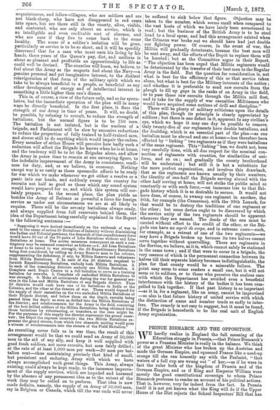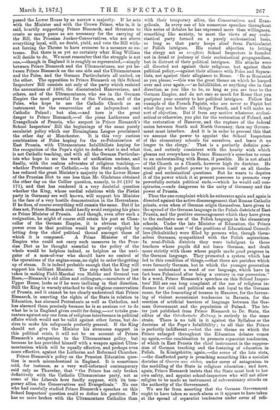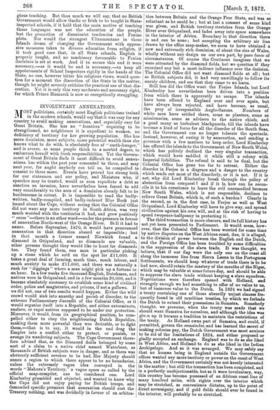PRINCE BISMARCK AND THE OPPOSITION.
hardly realize in England the full meaning of the Education struggle in Prussia,—that Prince Bismarck's power as a Prussian Minister is really in the balance. We think of the great Minister who has broken up the Austrian and made the German Empire, and squeezed France like a used-up orange till she can honestly say with the Psalmist, "that waters of a full cup are wrung out" of her,—as if he were in fact the ruler both of the kingdom of Prussia and of the German Empire, and as if King and Emperor William were merely the good constitutional sovereign to whom Prince Bismarck professes to render an account of his political actions. That is, however, very far indeed from the fact. In Prussia itself it is not yet known what the King will do if the Upper House of the Diet rejects the School Inspectors' Bill that has passed the Lower House by so narrow a majority. If he acts with the Minister and with the Crown Prince, who is, it is said, heartily supporting Prince Bismarck, and threatens to create as many peers as are necessary for the carrying of the Bill, the Prussian Junker-Conservatives, who are above everything loyal, will, no doubt, yield, and vote the Bill with- out forcing the Throne to have recourse to a measure so ex- treme. But there is as yet no certainty what King William will decide to do. We must remember that the struggle is not one,—though in England it is roughly so represented,—simply between Prince Bismarck and the Ultramontanes, nor yet be- tween Prince Bismarck on the one side and the Ultramontanes and the Poles, and the German Particularists all united, on the other. The opposition to Prince Bismarck on this School Inspectors' Bill consists not only of the party which resisted the annexations of 1866, the discontented Hanoverians, and others, and of the Ultramontanes, who see in the German Empire the most powerful foe of the Vatican, and of the Poles, who hope to use the Catholic Church as an instrument for the resurrection of an independent and Catholic Poland ; but also,—and here is the great danger to Prince Bismarck,—of the pious Lutherans and Evangelicals of Prussia, who suspect in Prince Bismarck's School Inspectors' Bill the beginnings of the same purely secularist policy which our Birmingham League proclaimed the other day at Manchester. It is this very curious combination of Poles hoping for the re-Polonization of East Prussia, with Ultramontane Infallibilists hoping for the recognition of the Pope's right to define what is and what is not Catholic teaching, and with all the German Particular- ists who hope to see the work of unification undone, and finally, with the zealous advocates of religious teaching,— whether Protestant or Catholic,—in the State schools, that has reduced the great Minister's majority in the Lower House of the Prussian Diet to one less than Mr. Gladstone obtained the other day on the Collier question, namely, to 26 (197 to 171), and that has rendered it a very doubtful question whether the King, whose cordial relations with the Pietist party in Germany are well known, will support his Minister in the face of a very hostile demonstration in the Herrenhaus. If he does, of course everything will remain the same. But if he does not, Prince Bismarck could hardly avoid resigning his place as Prime Minister of Prussia. And though, even after such a resignation, he might of course still retain his post as Chan- cellor of the German Empire, it is obvious that his power even in that position would be greatly crippled by letting drop the chief political thread amongst those of which it is composed. A Prime Minister of the Empire who could not carry such measures in the Prus- sian Diet as he thought essential •to the policy of the whole would be helpless indeed, as helpless as the navi- gator of a man-of-war who should have no control of the operations of the engine-room,no right to order the getting up of steam. It is indeed probable enough that the King will support his brilliant Minister. The step which he has just taken in making Field-Marshal von Moltke and General von Roon,—Bismarck's old allies and colleagues,—members of the Upper House, looks as if he were inclining in that direction. Still the King is warmly attached to the religious conservatism of Prussia, and it cannot be too clearly understood that Prince Bismarck, in asserting the rights of the State in relation to Education, has alarmed Protestants as well as Catholics, and has alarmed them precisely because he is so anxious not to do what he is in England given credit for doing,—not to take gua- rantees against any one form of religious interference in political affairs which would not be valid against other forms, but de- sires to make his safeguards perfectly general. If the King should not give the Minister his strenuous support in this political crisis, it will not be on account of Prince Bismarck's antagonism to the Ultramontane policy, but because he has provided himself with a weapon against Ultra- montanism which will be equally effective, and perhaps even more effective, against the Lutheran and Reformed Churches.
Prince Bismarck's policy on the Prussian Education ques- tion is mach misunderstood in England. It is sometimes said, for instance, as a very well-informed contemporary said only on Thursday, that "the Prince has only broken definitively with the Catholic Ultramontane party, not as some of the Liberals here fondly suppose, with its tem- porary allies, the Conservatives and Evangelicals." No one who had carefully studied Prince Bismarck's speeches on this School Inspectors' question could so define his position. He has no more broken with the Ultramontane Catholics than
with their temporary allies, the Conservatives and Evan- gelicals. In every one of his numerous speeches throughout this series of debates he has expressed more than willingness, something like anxiety, to meet the views of any eccle- siastical party formed on a purely ecclesiastical basis, so long as that party keeps aloof from Particularist or Polish intrigues. His rooted objection to letting the clergy act as ex-officio School Inspectors is founded not in dread or jealousy of their ecclesiastical propagandism, but in distrust of their political intrigues. His attacks were all directed not against their religious, but against their political policy,—against their alliance with Poles and Separa- tists, not against their allegiance to Rome. Be as Romanist as you please,'—this was the great theme on which he harped over and over again,—' as Infallibilist, or anything else in that direction, as you like to be, so long as you are true to the German Empire, and do not care so much for Rome that you postpone your country to her political intrigues. Follow the example of the French Papists, who are never so Papist but what they are before all things French, and I will make no sort of objection. But if from any motive whatever, ecclesi- astical or otherwise, you plot for the restoration of Poland, and the restoration of Hanover, and the rupture of the federal union between South and North Germany, then my Govern- ment must interfere. And it is in order to prevent this that we assume the power to appoint the School Inspectors of the elementary schools for ourselves, and leave it no longer to the clergy.' That is a perfectly definite posi- tion, and entirely consistent with the hearty wish which gleams out everywhere in Prince Bismarck's speeches to come to an understanding with Rome, if possible. He is not afraid of the Church as a Church, however high its doctrine. He would give it perfect power to govern itself on all theolo- gical and ecclesiastical questions. But he wants to deprive it of the power which it at present possesses to promote very powerfully certain political ends,—which he would call con- spiracies,—ends dangerous to the unity of Germany and the power of Prussia.
Thus the one complaint which he reiterates again and again is directed against the active discouragement that Roman Catholic priests, even when of German origin themselves, have given to the spread of the German language in the Polish districts of East Prussia, and the positive encouragement which they have given to the exclusive use of the Polish language in the elementary schools. Under the late Minister of Education, the Prince complains that most "of the positions of Educational Council- lors (Schulrfithe) were filled by persons who, though them- selves Germans, sympathized with the Polish aspirations. In semi-Polish districts they were indulgent to those teachers whose pupils did not learn German, and dealt more strictly with those whose pupils made good progress in the German language. They promoted a system which has led to this condition of things,—that there are parishes which were formerly German, but in which the younger generation cannot understand a word of our language, which have in fact been Polonized after being a century in our possession." In a word, Prince Bismarck's speeches on this School Inspec- tors' Bill are one long complaint of the use of religious in- fluence for civil and political ends not loyal to the German cause, for the fomenting of treason in Hanover, for the favour- ing of violent secessionist tendencies in Bavaria, for the erection of artificial barriers of language between the Ger- man Government and the population of Poland. The let- ter just published from Prince Bismarck to Dr. Stein, the
editor of the Ost-deutsche Zeitung, is entirely in the same
strain. There is no talk in it against the Syllabus or the doctrine of the Pope's Infallibility ; to all that the Prince is perfectly indifferent ;—but the one theme on which the Prince enlarged throughout the Education debates comes up again,—the combination to promote separatist tendencies, of which in East Prussia the chief instrument is the suppres- sion of German teaching and the fostering of education in Polish. In Konigshiitte, again,—the scene of the late riots, —the disaffected party is preaching something like a socialist
doctrine of Guerre aux riches, under cover of antagonism to the meddling of the State in religious education ; and here,
again, Prince Bismarck insists that the State must look to her own safety, and appoint school-inspectors who will not allow religion to be made an instrument of subversionary attacks on the authority of the Government. We are far from asserting that the German Government ought to have taken so much alarm as it appears to have taken at the spread of separatist tendencies under cover of reh- eons teaching. But thus much we will say, that no British Government would allow Gaelic or Irish to be taught in State- inspected schools, if it held that the main motive of teaching those languages was not the education of the people, but the promotion of disunionist tendencies and Fenian plots. Nor would the strongest Ultramontane in these Islands dream of charging the Government with oppres- sive measures taken to divorce education from religion, if it took good care that, in all State schools, English is properly taught, and no machinery favourable to Fenian doctrines is set at work. And if to secure this end it were necessary,—as it would be and is necessary,—to keep all appointments of School Inspectors rigidly in the hands of the State, no one, however bitter his religious views, would ques- tion for a moment the discretion of the State in the matter, though he might severely criticize the practical use of that dis- cretion. Yet it is only this very moderate and necessary right, for which Prince Bismarck is now so energetically struggling.




































 Previous page
Previous page